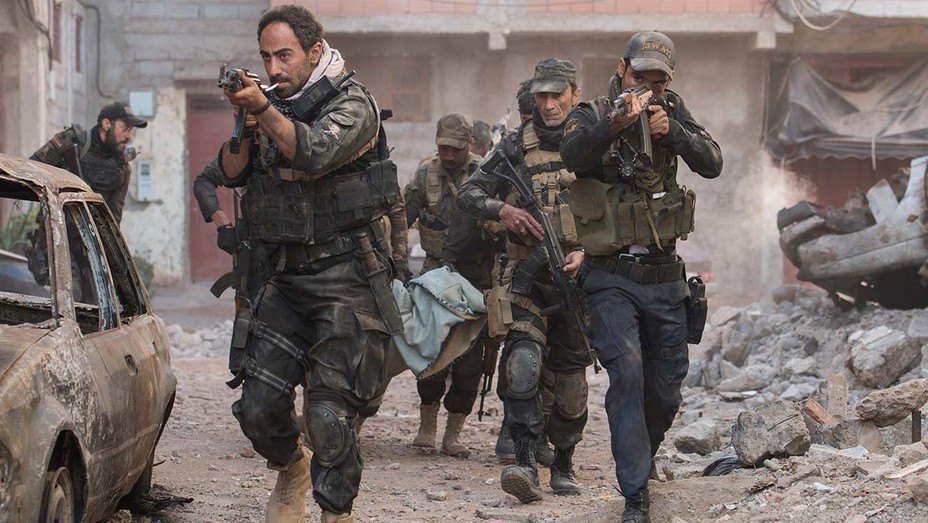This site is 100% about finding smaller, non-Hollywood-self-impressed films, that will make you think. And generally speaking, this isn’t a movie review website… like at all. I try to only bring you movies that I think you might enjoy. Or at the very least, a movie that will force you to take it seriously… and think. And today, I bring to you the Netflix financed foreign film, Mosul, as an alternative perspective on the chaos in Iraq. Alright, let’s do this… here is my movie recommendation Mosul on Netflix.
Mosul is in the class of war film that is determined to shed new light on the world of global war. Man’s inhumanity to man, et al. Too often war movies are western centric…or worse, America-centric. And that jaundices the audience to a certain assumed perspective of moral right, and moral wrong. (While hiding many of America’s obvious failures as a global leader (and pillager?)) But with Mosul, we walk into a crazy upside down world where we don’t have a firm grasp on who the good guys are, who the bad guys are, and we allow the film itself to orient us to where north really is. Mosul is in the class of war movie that is right up there with the film Monos – which I declared the movie of the year last year. (And it didn’t even make it to the Oscars to represent Colombia? Yeah, there are very real reasons why we should all be disappointed with the Football King and Queen popularity award entertainment show that is known as the Oscars.)
I will talk about this movie a little bit below – but I’d prefer you to just watch it, then come back and chat with us about the deeper meaning of the movie Mosul. It’s easy to get your hands on, seeing as though it’s on Netflix. Normally foreign films can be a bit tricky to watch. But this is as easy as flipping open Netflix and going. So, no excuses.
The Disorienting World of Mosul
As the movie opens, we start with a young police officer and his older counterpart. He obviously has no idea what he’s doing trying to enforce the law here in Mosul. Now, you may not know this, but between 2014 and 2017, ISIS completely took over the Iraqi city of Mosul. For three solid years it was a walled off horror show. And the only consistent group that pushed back against ISIS was a SWAT unit from the Nineveh province. So it was within this terrible situation that the 21-year-old, green Kawa (played by Adam Bessa) is stranded as a police officer. He’s obviously trying to do the right thing. But it’s clear he has absolutely no idea what is going on all around him.
Which, from a narrator standpoint, is brilliant. Why? Because we don’t have any better idea what is happening than he does. Soon after the film starts, he and his partner are stuck trying to defend their injured family, and brothers, from the onrushing ISIS forces. Assured they were about to die horribly, they are shocked when out of nowhere, Kawa and his partner are saved by the Nineveh SWAT team. After checking their names against a list their commander carries around with them, he decides they are okay to live. And then they offer Kawa a spot in their team. And from there on out Kawa follows his new team, still confused as ever. A few minutes later, Kawa notices his old partner pointing out their location to the local ISIS forces, and he starts to wonder where his partner’s allegiances laid.

For Kawa, the important question was – what were they doing. But, being new, his team wasn’t telling him anything. Which made this the most interesting aspect of the film – were we aiding and abetting terrorists by following along? Was Kawa walking off a moral precipice he wasn’t ever going to come back from? I literally had no idea what was going on. And with every person they killed, or with every member of their team that died I couldn’t figure out where my own allegiances should lie either.
Their team, in the middle of a firefight, strikes up an exchange with a local militia fighting ISIS as well. They have extra bullet rounds of a certain type that they can’t use. And the SWAT team has cartons of cigarettes they can’t possibly smoke. But when their leader, Jasem, goes into the basement to make the deal, he discovers Kawa’s partner among the prisoners. This escalates everything to unbelievable levels because the SWAT team believes Kawa’s partner should be their prisoner, and no one else’s. (After all, he did betray them to ISIS immediately after Kawa’s departure.) I found this moment of the movie to be straight out of the end of True Romance. Somehow, our protagonists have found themselves in this horrible Mexican standoff with these other soldiers of dubious intent. Everyone is going to die unless something miraculous happens. And that is when Kawa takes matters into his own hands and kills his ex-partner. Just like that? We find ourselves negotiating cartons of cigarettes for boxes of ammo again. Huh. Who knew? It was just a fantastically scripted, staged, and acted scene.
When the group learns that there is an ISIS base in their way – obstructing their path, the team needs to make a decision. Should they, ten men, attack the base, in the hope of not leaving them behind their position? Or, should they attempt to attack it in the hopes of protecting their eventual retreat? Ultimately they decide to attack the outpost, and everything goes wrong from the start. But when it is finally over, they succeed in overrunning the base, and killing everyone that was there. But Jasem, attempting to clean up the trash, and the pornography he finds, ends up setting off a booby-trap and dying. Which, I found really compelling. All throughout the movie, Jasem had been picking up trash, and throwing it away. Such a simple thing…but in a war ravaged country, such as Iraq, it symbolizes so much more.
In many developing countries that I have visited, a simple idea, such as a trash can? Completely foreign concept. Because, think about it. A trash can is more than just a receptacle. It’s a social contract. Someone puts a trash can out, and it’s promise. It’s you saying to those nearby, I will take the discarded refuse from your life, and I will make certain that trash goes somewhere responsible. But it also means that you believe in the possibility of your country being more than just a pile of rubbish. That you believe in your fellow countrymen. That you think there is a possibility for more. What this leader was doing symbolized what he hoped for his country, his people, and this world really. It was a moral movement – pornography – it was a social movement – trash & refuse – it spoke of bettering the country for a new way of thinking. I found this one little repeated gesture very significant. Because, did you see the way the other people looked at him when he picked up the trash? They thought him crazy. Literally certifiable. I too have found people staring at me in other countries as I picked up trash from a gift I had just given. Trash that the children just instinctively let gravity “carry it away.” This is a very big tide to turn, and yet, our Jasem? He believed that the change started with himself.
Regardless, most war movies speak to a hill to take. A line to cross. Or an enemy to kill. But with Mosul, our hidden objective was none of those things. Eventually when Kawa learns of their objective, it changes everything for him. Their mission is a rescue mission for loved ones trapped behind enemy lines. Wives that were being raped. Children that were enslaved. These loved ones are marked as family of the enemy, and so are being treated like chattel. Property. And when Kawa and the team finally make it through the door to Waleed’s apartment, where his family is enslaved…the triumphant moment is just seeing him reunited with his wife and child. The realization that this was the goal – this was the objective, only dawned on me gradually. As the camera moved from one face to the other. As the family tried to deal with the trauma of what they had all been through. It really was a strange ending for a war film…and yet, when it was over, I couldn’t think of a more fitting ending.
Personally, this movie seemed like a really good, and actually more fitting, war movie conclusion than really any other war movie I’ve ever watched. It concentrated on the valiant efforts of a few men…but when the movie is over we realize that something else had been going on all along. They were a team that had gone AWOL. They left the standard fighting ranks solely because they had been told to pull back to the safe side of the city. But they disobeyed these orders only because they were upset about what was happening to their trapped loved ones. They disobeyed orders solely to go, one by one, and rescue the family of each team member that was still alive. It’s a heartbreaking realization.
Edited by: CY



